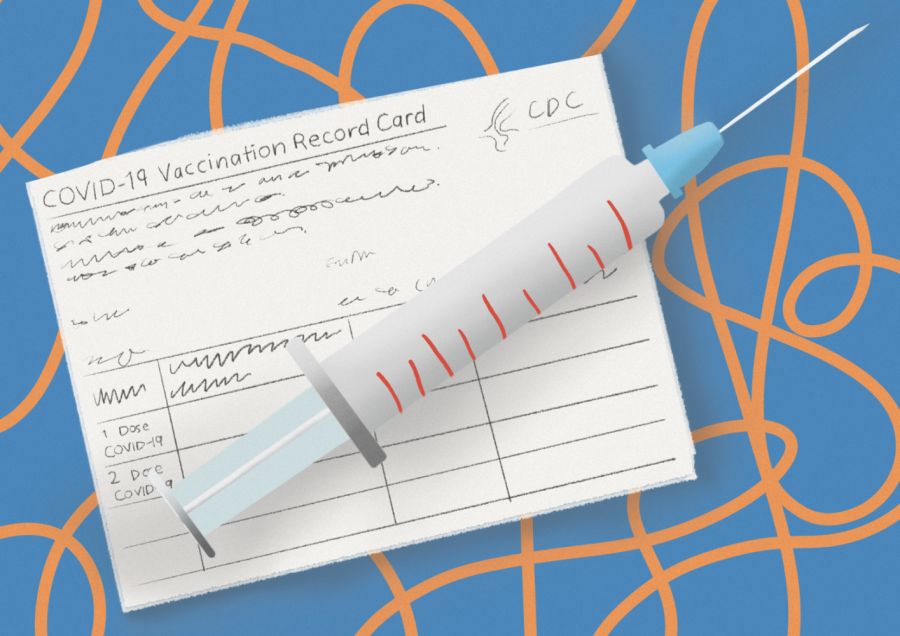Liberal Studies first-year MaryCharlotte Barnes plans to sign up for the first dose of the COVID-19 vaccine on April 6, when she, and all New York state residents aged 16 and over become eligible to take it. But she previously had an opportunity to get the vaccine weeks in advance, despite being ineligible.
Ineligible NYU students living in residence halls have utilized a loophole to receive vaccines. These students tell vaccine providers that they live in congregate living facilities, even though university dorms are not considered as such.
Some students living in residence halls told vaccine providers they reside in congregate living facilities, even though students living in university dorms do not count as residents of such facilities under New York City guidelines.
In New York City, residents of congregate living facilities include people in nursing homes, homeless shelters and domestic abuse shelters. While the New York City guidelines do not count college students in residence halls, the CDC guidelines include “student and faculty housing” within their definition. While some students knew that residence halls did not count under New York City protocols, others misunderstood the contradicting rules.
“I know people who have signed up for [the vaccine] knowing that congregate housing didn’t count for college students,” Barnes said. “On one hand, I thought I shouldn’t do that because it takes away from people in the age group or at high risk, but on the other hand, I was nervous about doing something that wasn’t allowed.”
According to Dr. Arthur Caplan, a bioethics professor and the founding head of the Division of Medical Ethics at NYU’s Grossman School of Medicine, dorms do not present much of a threat to students who wear masks and social distance.
“There’s a notion that COVID-19 is really deadly, if not to students, but the students’ parents and grandparents,” Caplan said. “They’re not thinking about how they don’t really need it if they wore their mask and are socially distanced, regardless of living in a dorm. You can protect yourself well if you choose to, but I think the psychology of scarcity plays into this. Nothing makes people want a vaccine more than saying it’s in short supply.”
Caplan says that healthcare workers and elderly people should be first in line to get vaccinated.
If it were up to Caplan, prisoners, people with disabilities living in group homes, and individuals developing COVID-19 tests and vaccines wouldn’t be far behind. He also believes New York state should have opened up vaccines to the general public sooner and better defined qualified categories.
“The definition of congregate living needs to be spelled out — who they really mean, and who they are talking about,” Caplan said.
Caplan has heard of ineligible individuals lying about living in congregate settings, being essential workers, having asthma, or smoking, in order to get the vaccine in the tri-state area. Lying on the attestation form is a misdemeanor and could result in up to a year in jail, as The New York Times reported. To combat line-jumping, Caplan thinks the best solution is to actively impose penalties — like fines or tickets — on people who lie.
A first-year at the School of Professional Studies and resident of an NYU dorm — preferring to remain anonymous over fear of retribution — signed up for the vaccine using the congregate facility loophole. They received a dose of the Pfizer vaccine on March 11.
“An hour later after signing up, they took the category off of Walgreens. From my understanding, I obviously knew that it was kind of a shortcut for younger people to get it, but at the same time, we were technically within the category,” they said, although residents living in NYU dorms do not actually fall into this category.
A Liberal Studies first-year — who also asked to remain anonymous — signed up for the Moderna vaccine and was vaccinated on March 8, because they assumed residence halls counted as congregate living facilities. They said a friend told them about making an appointment on the Walgreens website, and that they know at least 10 other students who also got the vaccine through the congregate living loophole.
“I thought congregate setting was implied, and NYU never clarified that,” they said. “Even in taking binx tests, the university didn’t say if we should put congregate living. I had been putting that down as well. The CDC guidelines also say that dorms qualify, but New York state guidelines were not specific about that.”
The LS first-year said they would not have gone through with their appointment if they knew that living in a dorm did not count as residing in a congregate living facility.
A version of this article appeared in the April 5 e-print edition. Email Rachel Cohen at [email protected].


























































































































































